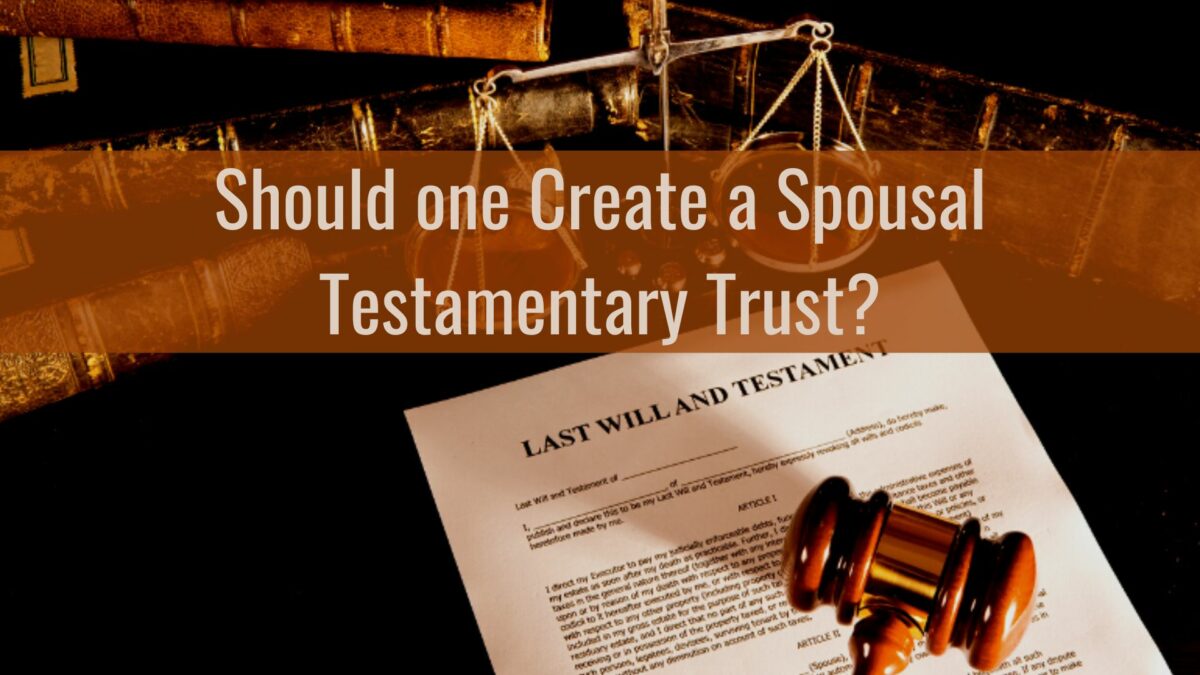“Die, v.: To stop sinning suddenly.”
–Elbert Hubbard
I recently had clients who were working on developing wills for their families ask me a question about creating a spousal testamentary trust and whether or not they (husband and wife) should create one.
If you’re using a standard online will creation program like LegalZoom, then you’ll probably come across this question:
Spousal Testamentary Trust.
Do you want the gift to your spouse to be held in trust?
If you answer “Yes”, your spouse can use the trust property during his or her lifetime. After your spouse passes away, the remaining trust property must go to the people you name later in the questionnaire.
If you answer “No”, your spouse will receive all of the property with no restrictions.

A spousal testamentary trust is one where, when the first spouse passes, instead of having everything in the estate pass to the surviving spouse, the assets pass instead into a living trust. Since the trust didn’t exist before the death, it is called a springing trust. The remaining spouse is named as a beneficiary, and usually, the amount available as income from the trust is limited. Additionally, a spousal testamentary trust must pass through probate and is subject to reporting from the court.
This means that the surviving spouse doesn’t get unfettered access to the assets of the spouse who just died.
Besides in the instance where you might have harbored a long-held grudge against the spending habits of the other spouse – in which case, you should have a deep discussion long before you reach the point of exploring the intricacies of the afterlife – there aren’t many cases where you’d want to provide a testamentary trust of any type. There are two which come to my mind:
- To protect your assets from Medicaid. If you’re the healthy spouse and your spouse is in declining physical or mental condition and you don’t have adequate assets or a long-term care insurance plan in place, then chances are pretty good that your spouse is going to eventually wind up in a Medicaid nursing facility. In this case, you could use a testamentary trust to avoid having all of the assets being spent away in nursing care and having your spouse wind up in a Medicaid facility anyway. THIS IS A CHOICE OF LAST RESORT! Did I make that clear? Be proactive and take control of your future and get yourself in a position where this is not necessary. I have family experience with Medicaid facilities and with private facilities, and I have never seen a Medicaid facility that was better than a private facility. Avoid this route if you can, but if you’re too far down the road, this could be used to protect some assets.
- Your spouse has disabilities to the point where he or she is not capable of taking care of his/her own needs. In this case, you’re creating a special needs trust, just as you would if you had a special needs child that you wanted to have taken care of after you pass. This will create a trustee whose responsibility is to make sure that your spouse is taken care of in the event of your passing.
Most states have a fairly simple process for establishing a trust via a will called the Uniform Custodial Trust Act (UCTA), so if your state has a standard Trust Act, then your bank will have appropriate documentation to set one up so that it is brought to life upon your passing (how ironic?).
If you’re looking to use a trust to avoid estate taxes, then there are better ways to accomplish it than by limiting your spouse’s benefits from the assets.
In either case, you’re best off speaking to a competent and qualified estate planning attorney if you think that you might need a trust.
Disclaimer: I’m not an attorney. I didn’t even sleep at a Holiday Inn Express last night. Please, please, please seek competent legal counsel before creating a trust.
If you’re concerned about doing your taxes correctly, I’ve used TurboTax Online (#aff) for several years, and, despite the complicated status of our taxes, have had no problems filing my taxes, saving us almost $1,000 compared to what we were paying our accountant when he prepared our taxes.
Author Profile
- John Davis is a nationally recognized expert on credit reporting, credit scoring, and identity theft. He has written four books about his expertise in the field and has been featured extensively in numerous media outlets such as The Wall Street Journal, The Washington Post, CNN, CBS News, CNBC, Fox Business, and many more. With over 20 years of experience helping consumers understand their credit and identity protection rights, John is passionate about empowering people to take control of their finances. He works with financial institutions to develop consumer-friendly policies that promote financial literacy and responsible borrowing habits.
Latest entries
 Low Income GrantsSeptember 25, 2023How to Get a Free Government Phone: A Step-by-Step Guide
Low Income GrantsSeptember 25, 2023How to Get a Free Government Phone: A Step-by-Step Guide Low Income GrantsSeptember 25, 2023Dental Charities That Help With Dental Costs
Low Income GrantsSeptember 25, 2023Dental Charities That Help With Dental Costs Low Income GrantsSeptember 25, 2023Low-Cost Hearing Aids for Seniors: A Comprehensive Guide
Low Income GrantsSeptember 25, 2023Low-Cost Hearing Aids for Seniors: A Comprehensive Guide Low Income GrantsSeptember 25, 2023Second Chance Apartments that Accept Evictions: A Comprehensive Guide
Low Income GrantsSeptember 25, 2023Second Chance Apartments that Accept Evictions: A Comprehensive Guide

